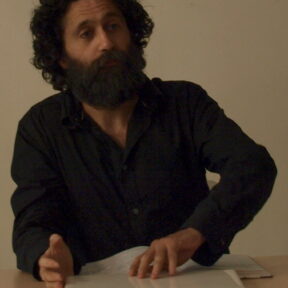
Gil Anidjar
: Photo from Creative Commons / Author of Photo: tomislavmedakOverview
* Professor of comparative literature at Columbia University
* Has taken the lead in anti-Israel divestment campaigns at Columbia
* Identifies “good teaching” with pro-Palestinian activism and “dissent”
Gil Anidjar is an Assistant Professor of Comparative Literature in Columbia University’s department of Middle East and Asian Languages and Cultures (MEALAC).
Anidjar presides over several classes at Columbia, all eschewing a historical and literary approach to Middle Eastern culture in deference to the radical paradigm of critical theory. One such course (required for all majors in MEALAC) is “Theories of Culture: Middle East and South Asia,” which encourages students to study cultures from those regions through a “theoretically informed language.” Another class, “Theories and Methods in Middle East and Asian Studies,” makes use of “postructuralism” and urges students to consider their subject through the prism of “power and resistance.”
Among the more controversial of Anidjar’s classes is one titled simply “Hate.” Purporting to “psychoanalyze” issues of hate, the course postulates that the history of Europe is reducible to an unrelieved procession of persecution of “the Other.” The crux of the class is Anidjar’s assertion that Europe has persecuted Jews and Arabs in equal measure and is therefore responsible for the “enmity” between Jews and Arabs—a claim that ignores the longstanding Arab hostility to a Jewish presence in the Middle East.
More aggressively political is Anidjar’s class, “Semites: Race, Religion, Literature.” The course parses, among other issues, the use of the term “Semite” and how it has “affected various aspects of academic and individual academics.” For Anidjar, the term is chiefly a convenient rhetorical cudgel with which to batter the legitimacy of the state of Israel. For instance, he has claimed in interviews that “the last Semites and the only Semites” are Arabs—an argument intended to undermine the legitimacy of Israel’s character as a Jewish state. Stretching this argument further, Anidjar has contended that “the Arabs have become the race that is still attached to its religion, whereas the Jews have in fact become Western Christians, and therefore are no longer marked, neither by race nor by religion.” Implicit in the professor’s remark is that Israel has no right to exist as a Jewish state, a point reinforced by Anidjar’s frequent tirades against Zionism, which he assails for what he calls its “apocalyptic dimensions.”
When speaking about Zionism, as he does in his classes, Anidjar also stresses: “The argument I want to make is that it is absolutely essential to continue to insist on the colonial dimension of Zionism, and colonial in the strict sense, absolutely.” In the professor’s view, “Israel is absolutely a colonial enterprise, a colonial settler state.” Far more charitable is Anidjar’s appraisal of Islam. “Can anyone seriously claim that the problem with Islamic countries is Islam?” he asks.
Professor Anidjar’s animus against Israel finds is most zealous expression in his recurring role as an anti-Israel activist-academic on the Columbia campus. On November 13, 2002—known as Columbia’s “National Day of Action Against Israeli Apartheid” to disciples of the leftist anti-Israel movement—Anidjar spearheaded a campus conference to divest Columbia from any dealings with Israeli companies.
Anidjar draws no distinction between the responsibilities of an academic and those of an activist. An academic, as defined by Anidjar, is not merely one who imparts knowledge or chaperones students in a dispassionate quest for truth, but may also be one who recruits them into his personal political causes. Of one such cause—“Palestinian rights”—Anidjar said on the occasion of a 2005 anti-Israel gathering: “It is—or it should be—the struggle of all students and all teachers, of all adjuncts and lecturers, of untenured as well as—believe me—tenured faculty.” Addressing himself to politically likeminded colleagues at Columbia, Anidjar added, “Continue to support [radical anti-Israel professor] [Joseph Massad][2] and remember Palestinian rights too. … Continue to voice your dissent. For that is good teaching.” Anidjar adduced his politicized conflation of activism and pedagogy as evidence of his “support for Academic Freedom.”